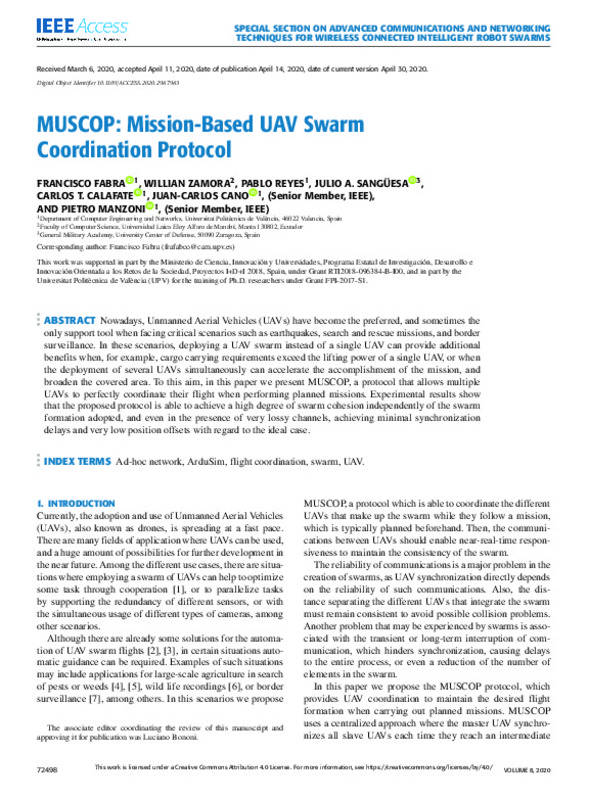JavaScript is disabled for your browser. Some features of this site may not work without it.
Buscar en RiuNet
Listar
Mi cuenta
Estadísticas
Ayuda RiuNet
Admin. UPV
MUSCOP: Mission-Based UAV Swarm Coordination Protocol
Mostrar el registro sencillo del ítem
Ficheros en el ítem
| dc.contributor.author | Fabra Collado, Francisco José
|
es_ES |
| dc.contributor.author | Zamora, Willian
|
es_ES |
| dc.contributor.author | Reyes, Pablo
|
es_ES |
| dc.contributor.author | Sangüesa, Julio A.
|
es_ES |
| dc.contributor.author | Tavares De Araujo Cesariny Calafate, Carlos Miguel
|
es_ES |
| dc.contributor.author | Cano, Juan-Carlos
|
es_ES |
| dc.contributor.author | Manzoni, Pietro
|
es_ES |
| dc.date.accessioned | 2021-03-23T04:31:01Z | |
| dc.date.available | 2021-03-23T04:31:01Z | |
| dc.date.issued | 2020 | es_ES |
| dc.identifier.uri | http://hdl.handle.net/10251/164054 | |
| dc.description.abstract | [EN] Nowadays, Unmanned Aerial Vehicles (UAVs) have become the preferred, and sometimes the only support tool when facing critical scenarios such as earthquakes, search and rescue missions, and border surveillance. In these scenarios, deploying a UAV swarm instead of a single UAV can provide additional benefits when, for example, cargo carrying requirements exceed the lifting power of a single UAV, or when the deployment of several UAVs simultaneously can accelerate the accomplishment of the mission, and broaden the covered area. To this aim, in this paper we present MUSCOP, a protocol that allows multiple UAVs to perfectly coordinate their flight when performing planned missions. Experimental results show that the proposed protocol is able to achieve a high degree of swarm cohesion independently of the swarm formation adopted, and even in the presence of very lossy channels, achieving minimal synchronization delays and very low position offsets with regard to the ideal case. | es_ES |
| dc.description.sponsorship | This work was supported in part by the Ministerio de Ciencia, Innovacion y Universidades, Programa Estatal de Investigacion, Desarrollo e Innovacion Orientada a los Retos de la Sociedad, Proyectos I+D+I 2018, Spain, under Grant RTI2018-096384-B-I00, and in part by the Universitat Politecnica de Valencia (UPV) for the training of Ph.D. researchers under Grant FPI-2017-S1. | es_ES |
| dc.language | Inglés | es_ES |
| dc.publisher | Institute of Electrical and Electronics Engineers | es_ES |
| dc.relation.ispartof | IEEE Access | es_ES |
| dc.rights | Reconocimiento (by) | es_ES |
| dc.subject | Ad-hoc network | es_ES |
| dc.subject | ArduSim | es_ES |
| dc.subject | Flight coordination | es_ES |
| dc.subject | Swarm | es_ES |
| dc.subject | UAV | es_ES |
| dc.subject.classification | ARQUITECTURA Y TECNOLOGIA DE COMPUTADORES | es_ES |
| dc.title | MUSCOP: Mission-Based UAV Swarm Coordination Protocol | es_ES |
| dc.type | Artículo | es_ES |
| dc.identifier.doi | 10.1109/ACCESS.2020.2987983 | es_ES |
| dc.relation.projectID | info:eu-repo/grantAgreement/UPV//FPI-2017-S1/ | es_ES |
| dc.relation.projectID | info:eu-repo/grantAgreement/AEI/Plan Estatal de Investigación Científica y Técnica y de Innovación 2017-2020/RTI2018-096384-B-I00/ES/SOLUCIONES PARA UNA GESTION EFICIENTE DEL TRAFICO VEHICULAR BASADAS EN SISTEMAS Y SERVICIOS EN RED/ | es_ES |
| dc.rights.accessRights | Abierto | es_ES |
| dc.contributor.affiliation | Universitat Politècnica de València. Departamento de Informática de Sistemas y Computadores - Departament d'Informàtica de Sistemes i Computadors | es_ES |
| dc.description.bibliographicCitation | Fabra Collado, FJ.; Zamora, W.; Reyes, P.; Sangüesa, JA.; Tavares De Araujo Cesariny Calafate, CM.; Cano, J.; Manzoni, P. (2020). MUSCOP: Mission-Based UAV Swarm Coordination Protocol. IEEE Access. 8:72498-72511. https://doi.org/10.1109/ACCESS.2020.2987983 | es_ES |
| dc.description.accrualMethod | S | es_ES |
| dc.relation.publisherversion | https://doi.org/10.1109/ACCESS.2020.2987983 | es_ES |
| dc.description.upvformatpinicio | 72498 | es_ES |
| dc.description.upvformatpfin | 72511 | es_ES |
| dc.type.version | info:eu-repo/semantics/publishedVersion | es_ES |
| dc.description.volume | 8 | es_ES |
| dc.identifier.eissn | 2169-3536 | es_ES |
| dc.relation.pasarela | S\409095 | es_ES |
| dc.contributor.funder | Agencia Estatal de Investigación | es_ES |
| dc.contributor.funder | Universitat Politècnica de València | es_ES |
| dc.subject.ods | 09.- Desarrollar infraestructuras resilientes, promover la industrialización inclusiva y sostenible, y fomentar la innovación | es_ES |








